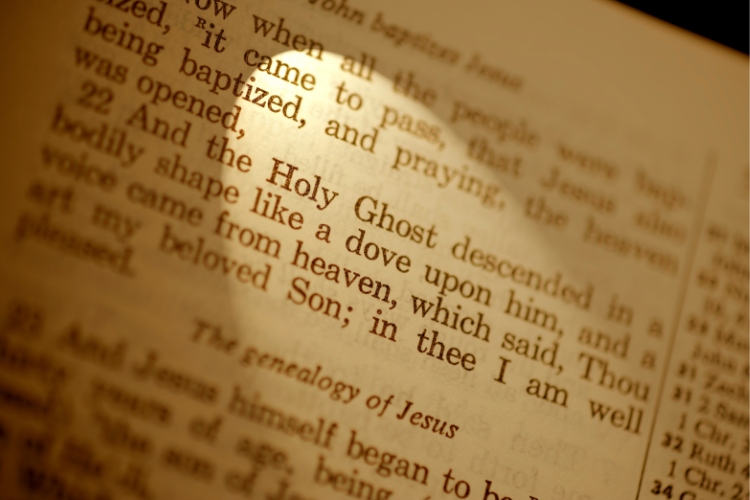The Bible, a cornerstone of spiritual guidance, has much to say about the nature of sin, the necessity of forgiveness, and the power of words, including the use of profane language.
In this blog post guide, we will talk and explore about the scriptural insights to understand what the Bible says about cussing, exploring the ethical teachings on speech, the importance of confession and repentance, and the practical applications of these teachings in daily life.
Key Takeaways
- Scripture emphasizes the pervasiveness of sin and the essential role of divine forgiveness, highlighting the need for individuals to address their sins through confession and repentance.
- The act of confession is not merely an acknowledgment of sin but a step towards transformation, with repentance leading to a promise of cleansing from unrighteousness.
- Understanding the language of the Bible, especially terms like ‘faithful and just,’ is crucial in grasping the full implications of divine forgiveness and how it contrasts with human sentiments.
- The Bible advocates for wholesome communication, warning against ungodly counsel and emphasizing the impact of words in either building up or tearing down relationships.
- Christians are called to live out forgiveness in their daily interactions and to strive for righteous speech, supported by the community of believers who encourage one another towards holy living.
The Biblical Perspective on Sin and Forgiveness
The Pervasiveness of Sin in Scripture
The Scriptures paint a vivid picture of the pervasiveness of sin, depicting it as a universal affliction that touches every aspect of human life. Sin is not merely a collection of individual acts, but a condition that plagues humanity.
- Original Sin
- The Fall of Man
- The Prophetic Warnings
- The Apostolic Teachings
The Bible’s narrative arc underscores the gravity of sin and its consequences. From the fall in Genesis to the prophetic calls for repentance, sin is shown to be deeply ingrained in the human condition.
The New Testament continues this theme, with apostles like Paul acknowledging the struggle against sin as an ongoing battle (Romans 7:13-25).
The challenge of sin is not just in its actions but in its ability to reside within the human heart, often masquerading as righteousness.
Recognizing the depth and reach of sin is crucial for understanding the need for divine forgiveness and the transformative power of grace.
The Necessity of Forgiveness
The concept of forgiveness is central to the Christian faith, embodying the transformative power of God’s grace. Forgiveness is not merely a divine courtesy, but a fundamental necessity for the restoration of the relationship between God and humanity.
The Bible underscores that all have sinned and fall short of the glory of God (Romans 3:23), establishing the universal need for forgiveness. Forgiveness is a recurring theme throughout scripture, illustrating its vital role in spiritual life.
Without forgiveness, the path to salvation remains obstructed, and the weight of sin continues to separate individuals from the divine presence. The act of forgiving and being forgiven paves the way for spiritual renewal and growth.
The moral therapeutic of forgiveness is not just a lofty ideal but a practical necessity. It liberates the soul from the bondage of sin and facilitates a journey towards wholeness.
The Bible presents a clear directive for believers to seek forgiveness and to extend it to others. This is not only an act of obedience but also a reflection of God’s own character:
- To be just, God forgives when sins are confessed.
- To be faithful, God forgives as a covenant fulfilled through Jesus Christ.
Embracing forgiveness is essential for anyone seeking to live in harmony with God’s will and to experience the fullness of His grace.
The Conditions for Divine Forgiveness
Divine forgiveness is not a right, but a grace bestowed upon those who recognize their need for it. To receive forgiveness, one must first acknowledge their sinfulness and unworthiness of God’s mercy.
This humility opens the door to the transformative power of grace, which not only condemns but also delivers and cleanses.
Forgiveness is a spiritual process that deepens our connection with God, allowing us to reflect His mercy and obey His will. The Bible emphasizes that forgiveness is abundant for all who call upon the Lord with a sincere heart. The conditions for receiving this forgiveness are clear:
- Recognition of one’s own sin and the need for mercy
- A heartfelt confession and renunciation of sin
- A commitment to turn away from wrongdoing and embrace a new life
The moral therapeutic of forgiveness is a powerful force. It liberates us from the constraints of malice and grudge, leading to spiritual renewal and peace.
The scriptures teach that through Jesus, forgiveness of sins is proclaimed, and all who believe are justified. It is a mystery how God can forgive us, but it is through His amazing grace that we find healing and peace.
Understanding Confession and Repentance
The Role of Confession in Spiritual Life
In the journey of faith, confession stands as a pivotal practice for spiritual well-being. It is not merely a ritual, but a profound act that paves the way for emotional healing and reconciliation with God.
By acknowledging our wrongdoings directly to the One we have sinned against, we open ourselves to the transformative power of divine forgiveness.
Confession is the sacred moment where human frailty meets divine mercy, initiating a process of restoration and renewal.
The Bible is explicit about the importance of confession. 1 John 1:9 states, “If we confess our sins, He is faithful and just to forgive us our sins and to cleanse us from all unrighteousness.” This promise encapsulates the essence of confession in spiritual life:
- Acknowledgment of sin to God
- Assurance of forgiveness
- Cleansing from unrighteousness
Through confession, we not only seek forgiveness but also affirm our commitment to spiritual growth and transformation. It is a step that aligns us with God’s covenant and justice, allowing us to partake in the fellowship of His divine nature.
Repentance: A Step Beyond Acknowledgment
Acknowledging sin is the first step towards redemption, but repentance is the transformative journey that follows. It is not merely an admission of wrongdoing but a renouncement of past behaviors and a commitment to a new path aligned with God’s will.
- Recognize the gravity of sin and its impact on the spiritual life.
- Confess with a genuine heart, taking full responsibility without excuses.
- Actively turn away from sin, embodying the change through actions.
Repentance is the bridge between recognizing our failings and actively pursuing a life of righteousness. It is a conscious choice to reject sin and embrace the teachings of Scripture.
True repentance involves a deep, personal introspection and a deliberate decision to forsake sin. It is a process that requires not only verbal confession but also a practical application in one’s life. This is the essence of repentance that leads to divine forgiveness and the restoration of fellowship with God.
The Promise of Cleansing from Unrighteousness
The Bible offers a profound promise to those who seek forgiveness: if we confess our sins, He is faithful and just to cleanse us from all unrighteousness. This assurance is not based on our own merit but on the righteousness of Christ, which is imputed to us through faith.
- Acknowledge your sins before God
- Trust in the righteousness of Christ
- Receive the promise of cleansing
The journey of sanctification is not about self-improvement but about divine grace washing away our sins. It is a transformative process that aligns our lives with the holy standard set by God, not by our own strength but through the work of Jesus Christ.
The scriptures encourage us to approach the throne of grace with confidence, knowing that our sincere confession will lead to a life renewed and free from the bondage of sin. It is a call to come as we are, to the foot of the cross, and to experience the liberating power of God’s forgiveness.
The Language of Scripture and Its Implications
The Significance of ‘Faithful and Just’ in Forgiveness
The phrase faithful and just encapsulates a profound truth about the nature of divine forgiveness. God’s commitment to forgive is not a mere display of mercy, but a testament to His unwavering faithfulness and His adherence to justice.
This is because Jesus, who sits at the right hand of God, endured the agony of the cross to ensure that both mercy and justice could be extended to repentant sinners.
The implications of this are staggering. Not only does God offer mercy, but His justice is also on our side when we seek forgiveness. This aligns with the Old Testament declaration that God is one who forgives iniquity and sin. It’s a promise that carries weight and hope for all who confess their transgressions.
The assurance of forgiveness is grounded in the very character of God. His faithfulness guarantees that He will honor His word, and His justice ensures that forgiveness is rightly ours through Christ’s atonement.
The expectation might be that God’s pity alone would be the basis for forgiveness. However, the scripture deliberately uses the terms faithful and just, highlighting that God’s forgiveness is as much a matter of divine integrity as it is of compassion.
Contrasting Divine Forgiveness with Human Sentiments
Divine forgiveness, as depicted in the Bible, operates on a plane distinct from human emotions and sentiments. God’s forgiveness is not contingent on feelings but on His unwavering faithfulness and justice. This is a profound departure from the human tendency to forgive based on subjective emotions like pity or mercy.
Forgiveness in the scriptural sense is a legal and moral act, grounded in the sacrifice of Jesus Christ. It is because of this sacrifice that God can be both just and the justifier of those who have faith in Jesus (Romans 3:26). The divine equation of forgiveness is not about God overlooking sin; it’s about sin being paid for, justly and faithfully.
- Divine Forgiveness: Just and Faithful
- Human Forgiveness: Often Emotional and Inconsistent
The grace of God offers forgiveness and transformation, but it also implies an acknowledgment of our own sinfulness and the need for redemption.
The contrast between divine and human forgiveness is stark, and it challenges believers to reflect on the nature of God’s grace. It is not merely a comforting thought but a call to recognize the gravity of sin and the magnificence of God’s provision for our redemption.
The Impact of Translation and Interpretation on Understanding
The process of translating and interpreting scripture is fraught with challenges. Significant discontinuities in the meaning and function of covenant signs can arise, leading to a divergence from the original intent.
For instance, the tendency to ‘Christianize’ the Old Testament and ‘Judaize’ the New Testament can flatten out the historical-redemptive transformation of terms, causing confusion among believers.
The Bible is filled with examples of people who swore! Today, cursing, swearing, and all types of profanity fill the air all around us.
This hermeneutical error leads to a twofold distortion of the relationship between the two testaments of the Bible. By ‘Christianizing’ the Old Testament, one might restrict the significance of circumcision to purely spiritual promises and blessings, while neglecting its national and historical context.
Conversely, ‘Judaizing’ the New Testament may impose Old Testament practices onto the New Covenant community without proper consideration for the new context established by Christ.
The Ethical Teachings of the Bible on Speech
The Counsel of the Godly Versus Ungodly
In the journey of faith, believers are often confronted with a choice: to heed the counsel of the godly or to be swayed by the ungodly. The heart of the righteous ponders how to answer, but the mouth of the wicked pours out evil things.
This contrast is stark and serves as a guiding principle for those seeking to live a life aligned with scriptural values.
The successful Christian walks not in the counsel of the ungodly, recognizing that such advice, even when cloaked in religious language, often leads away from the path of righteousness.
The Bible emphasizes the importance of discernment in choosing whose advice to follow. The godly offer wisdom that aligns with divine principles, while the ungodly may provide counsel that seems appealing but ultimately leads to spiritual compromise. Here are some considerations for distinguishing between the two:
- The godly counsel leads to spiritual growth and alignment with God’s will.
- Ungodly advice often prioritizes worldly success over spiritual integrity.
- The godly are characterized by their commitment to scriptural truth, even when it is countercultural.
- The ungodly may use Scripture to justify actions that are not in keeping with biblical teachings.
The Power of Words: Building Up or Tearing Down
The Bible emphasizes the profound impact that our words can have on others. Proverbs 15:4 describes the soothing effect of a gentle tongue, likening it to a tree of life, while harsh words can crush the spirit. This duality illustrates the power of speech to either nurture growth or inflict damage.
- Building Up: Encouraging, comforting, and edifying speech.
- Tearing Down: Hurtful, destructive, and discouraging words.
Words are not merely sounds caused by air passing through our larynx. They have real power: power to make a change, power to destroy, power to build up and to create.
It is crucial to recognize the responsibility that comes with this power. The Bible urges believers to use their words wisely, ensuring they are a source of healing and strength rather than a weapon of harm. As followers of Christ, we are called to reflect His love and grace in every word we speak.
The Biblical View on Wholesome Communication
The Bible emphasizes the transformative power of speech, urging believers to use their words to edify and uplift others. Proverbs 18:21 declares that life and death are in the power of the tongue, a principle that resonates with the snippet highlighting the power of life and death in our speech.
In the context of wholesome communication, the Scripture provides practical guidance:
- Speak truthfully and with love (Ephesians 4:15)
- Avoid corrupt talk, but instead offer words that benefit others (Ephesians 4:29)
- Let your conversation be gracious and seasoned with salt (Colossians 4:6)
The essence of holy conversation is not merely in avoiding harm, but in actively seeking to bless and build up the community around us.
This approach to communication is not just about refraining from cussing or negative speech, but about fostering a culture of kindness and encouragement that reflects the holiness to which we are called.
Practical Applications of Scriptural Teachings
Living Out Forgiveness in Daily Life
In the journey of faith, living out forgiveness is a transformative practice that reflects the heart of Christian discipleship. By extending forgiveness to others, we not only release them from the burden of their wrongs but also liberate ourselves from the chains of bitterness and resentment. This act of grace is a vivid demonstration of the love and mercy we have received through Christ.
To forgive is to set a prisoner free and discover that the prisoner was you.
Embracing forgiveness in daily life involves intentional steps:
- Acknowledge the hurt and the need to forgive.
- Decide to forgive, even when emotions resist.
- Pray for the strength to forgive and for the well-being of the one who wronged you.
- Act in kindness, breaking the cycle of retaliation.
- Reaffirm your commitment to forgive, as often as necessary.
The healing power of forgiveness is not just a spiritual concept; it is a practical reality that can transform relationships and bring peace to troubled hearts. As we practice forgiveness, we become living examples of the grace we advocate, fostering a community that values reconciliation over division.
Navigating the Challenges of Righteous Speech
In the journey of faith, navigating the challenges of righteous speech can be a complex task. The Bible encourages believers to be as upright as the palm and as unbending as a steel beam, suggesting a steadfast adherence to godly principles in communication.
The delineation between right and wrong must be clear, and our words should reflect this distinction.
The counsel of the godly stands in stark contrast to the ungodly, and it is in this contrast that the believer must find their voice. To speak righteously is to reject the counsel of the ungodly, which may come cloaked in soothing tones and agreeable words, but ultimately leads away from truth.
To aid in this endeavor, consider the following steps:
- Reflect on Romans 12:2, which calls for transformation and renewal of the mind to discern the will of God.
- Examine the edges of your life for sharpness, ensuring that your speech is not blunted by the pressures to conform.
- Stand firm in your convictions, even if it means facing criticism or misunderstanding.
The path to righteous speech is not one of ease, but of conscious effort and divine guidance.
The Role of the Christian Community in Encouraging Holy Living
The Christian community plays a pivotal role in fostering an environment where believers can grow in holiness and practice righteous speech. Community is encouraging, offering a space where individuals at various stages of their faith journey can support and inspire one another.
This mutual edification is essential for maintaining a lifestyle that reflects the teachings of the Bible on wholesome communication.
Accountability within the community is key to navigating the challenges of righteous speech. Believers are encouraged to hold one another to the standards set forth in Scripture, gently correcting and guiding each other towards the use of edifying language.
The Christian community should be a haven where grace abounds and the moral impulse to speak life is nurtured by collective worship and fellowship.
To effectively encourage holy living, the community can implement practical steps such as:
- Organizing small groups focused on studying the ethical teachings of the Bible.
- Encouraging testimonies of personal growth in the area of speech.
- Providing mentorship programs that pair mature believers with those seeking guidance.
- Promoting events and activities that celebrate the power of wholesome words.
Conclusion
In exploring the scriptural insights on the topic of cussing, we have delved into various aspects of how the Bible addresses the power of words and the importance of purity in speech. The Bible emphasizes the need for confession and forgiveness, highlighting that our words reflect the condition of our hearts.
It is clear that cussing, which often stems from anger, frustration, or a lack of self-control, is not in harmony with the scriptural call to speak with grace and truth. As believers, we are encouraged to seek transformation through the renewing of our minds, allowing our speech to be seasoned with salt and edifying to others.
Ultimately, the Bible’s teachings guide us towards a path of righteousness in every aspect of life, including our communication. Let us, therefore, strive to align our words with the divine wisdom found in the Scriptures, knowing that every word we utter holds the potential to build up or tear down.
FAQs:
What does the Bible say about the nature of sin?
The Bible describes sin as pervasive, injurious, and alienating, affecting all of humanity. It emphasizes the need for sin to be dealt with due to its harmful and destructive qualities.
Is forgiveness of sins a central theme in the Bible?
Yes, forgiveness is a core concept in the Bible. It suggests that God’s purpose for the scriptures is to address the fallen state of humanity and provide a means for forgiveness and reconciliation.
What is required for divine forgiveness according to the Bible?
The Bible states that confession and repentance are necessary for divine forgiveness. 1 John 1:9 specifically mentions that if we confess our sins, God is faithful and just to forgive us and cleanse us from all unrighteousness.
Why does the Bible emphasize God being ‘faithful and just’ in forgiving sins?
The Bible emphasizes God’s faithfulness and justice to highlight that forgiveness is not merely an act of mercy or pity, but a righteous and reliable promise based on His character.
How does the Bible guide us in our speech and communication?
The Bible advises against ungodly counsel and encourages wholesome communication that builds up rather than tears down, emphasizing the power of words in shaping our relationships and spiritual life.
What role does the Christian community play in promoting holy living according to the Bible?
The Christian community is portrayed in the Bible as instrumental in encouraging holy living, providing support, accountability, and a space to practice righteousness and forgiveness in daily life.











